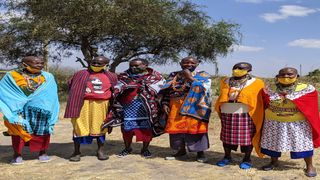
Some of the reformed circumcisers during an anti-fgm campaign in Ekinye village, Kajiado Central sub-county on July 17, 2021.
| Stanley Ngotho | Nation Media GroupKajiado
Premium
Big win for Maasai girls as notorious cutters become anti-FGM czars
Notorious female circumcisers in Kajiado County have had a road to Damascus moment and ditched the barbaric practice to become champions of Maasai girls’ rights.
These ageing women now make modern mats in a community centre in Enkinye village, Kajiado Central sub-county, under a non-governmental organisation called Il’laramatak Community Concerns (ICC).
Some women are involved in the milk business as an alternative way to earn a living.
Over the years, the women mutilated the genitals of young Maasai girls for a fee in a culture handed down over generations.
In the Maasai community, girls undergo the cut as a rite of passage to womanhood, meaning it is a prerequisite for marriage.
Turasha Tulei, 67, who doubled up as the chief circumciser and trainer of circumcisers, said it dawned on her that the practice was retrogressive.
She would charge between Sh1,500 and Sh2,000 per girl, with school holidays a peak period, when she would attend to at least five girls daily.
A Maasai traditional hut was considered ideal for the "cut".
"My homestead used to be a hive of activity as girls queued early in the morning or in the evening for the cut. I used a razor blade to mutilate the clitoris,” she said.
“I learned the trade from my grandmother when I was young. I have now seen the light and stopped it," she said, adding that she had been in the barbaric trade for more than 30 years.
Like fellow reformed cutters, Mrs Turasha now acknowledges that the practice has been a major setback in girls’ education as most girls were given out to suitors for a marriage after being genitally mutilated.

Some women are involved in the milk business as an alternative way to earn a living.
"Once the girl underwent FGM, she was considered an adult ready for marriage at the expense of formal education. In the Maasai community, we have many teen mothers who were married off after undergoing FGM. We are now advocating for Maasai girls’ rights,” she said.
Reformed circumcisers
Today, the reformed circumcisers spend most of their time reaching out to women in different villages rooting for an FGM-free community in a campaign called “Cut the Garment, Not the Girls”.
When Nation.Africa spoke with the women at ICC, they were full of life, regretting their past.
They carry a community’s dark secrets and are the reason for the pain and dashed hope of countless girls.
But their willingness to change was evident in their eyes.
Former national anti-FGM board member and ICC founder Agnes Leina said the war against the practice was bearing fruits in the region.
She said FGM cases have declined significantly after the traditional circumcisers abandoned their tools.
She cautioned the community against perceiving girls as a means of income through bride price.
A mega milk plant is being set up at the centre to boost Maasai women economically.
“We began the journey of reaching out to traditional circumcisers in 2016 during the Enkorica declaration. Notorious "cutters" have reformed, boosting the war against FGM. We have partnered with several NGOs and the government to free our girls from the shackles of FGM," Ms Leina said.

Turasha Tulei, 67, (pictured) who doubled up as the chief circumciser and trainer of circumcisers, said it dawned on her that the practice was retrogressive.
However, cross-border FGM in Kenya and Tanzania has been rolling back the gains made in the last three years.
Semerian Sankori, founder of the NGO Patinaai Osim, said girls are sneaked across the border using clandestine routes for the cut. Unlike before, no ceremonies are held as it is usually done at night to evade the security apparatus.
"Cross-border FGM has taken centre stage especially in Kajiado East and South sub-counties. Nowadays, girls are subjected to the vice when they are below five years old. Some local administrators are abetting it," Ms Sankori said.
C-section deliveries and fistula cases in most Kajiado hospitals are said to have skyrocketed in the county owing to the effects of FGM.
"We have been advocating for proper feeding to our expectant mothers for a healthy foetus. Due to the scars and stitches left after FGM, some of the women cannot give birth normally," a midwife at Kajiado Referral Hospital said.
A group of university students in Kajiado East sub-county have also positioned themselves as anti-FGM champions, reaching out to elders and their peers. They believe dialogue will break the vice that is associated with poor reproductive health in the Maasai community.
In 2019 Kajiado launched a robust policy designed to end FGM at the community level.
The policy, which is firmly grounded on the principles of gender equality, inclusivity and non-discrimination, provides the legal framework for fast-tracking the eradication of FGM at the county level by creating decentralised governance structures that will be cascaded from the ward level to the county level.
"We have realised that the law alone cannot stop FGM, employing community-based approaches especially the influencers in those communities is a big win.
"Converting the perpetrators to become anti-FGM crusaders is even more powerful because of their connection and status in the community. They are in fact the best to lead the campaign," said Judie Kaberia, the Gender Media Trainer at the Voice for Women and Girls' Rights.





